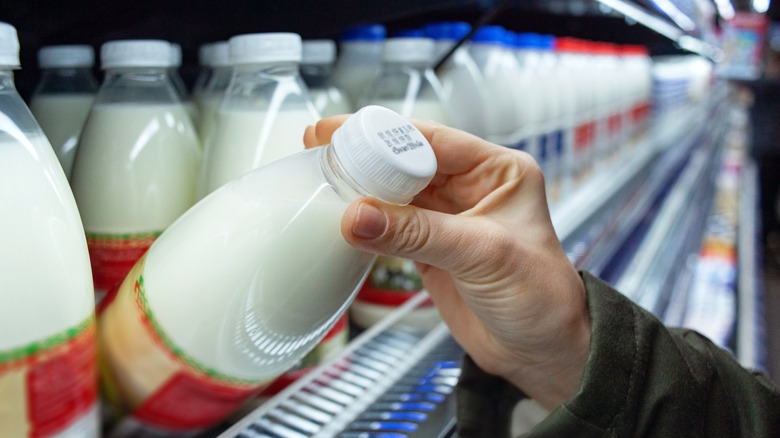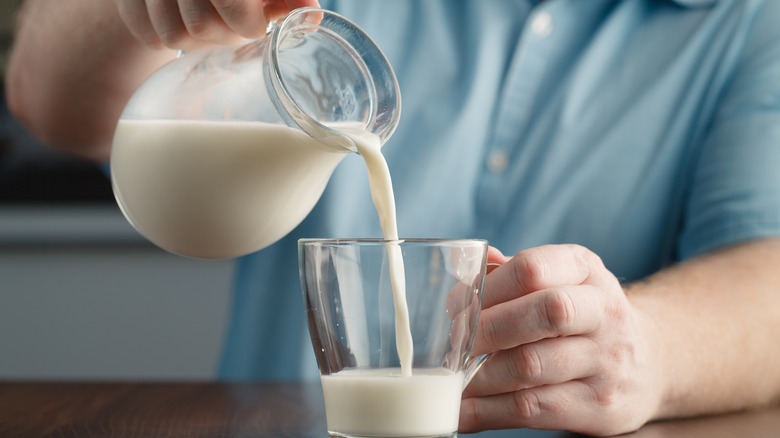Is Milk Good For Diabetes?
From protein to antioxidants, milk certainly packs a punch when it comes to nutritional value. In fact, in a single cup of whole cow's milk, you'll get a hefty dose of potassium, phosphorus, selenium, and vitamin B12, reports Healthline. Not only that, but you'll get enough calcium, vitamin D, and riboflavin to cover about one-fourth of your recommended daily intake of each. With so many vitamins, minerals, and nutrients to offer, milk is thought to promote bone health and reduce one's risk of obesity. What's more, some research suggests that regular consumption of milk might help protect against hypertension (via University of Utah Health).
So if milk is such a nutritional powerhouse, does that mean it may be beneficial for those with diabetes? While there are different types of diabetes, the U.S. Centers for Disease Control and Prevention (CDC) explains that the condition is one in which the body is unable to effectively produce or utilize insulin to generate energy. Food items containing high amounts of sugar or starchy carbohydrates can cause blood sugar levels to increase, posing a risk to those with diabetes, according to Medical News Today. For this reason, soda, white bread, processed foods, and energy drinks are examples of some food items to avoid. So where does that leave milk?
Types of milk to avoid if you have diabetes
According to Dr. Pakhi Sharma of Phable, milk can be good for patients with diabetes — but only if they're drinking certain kinds of milk. Milk holds a low glycemic index (GI) of 31, meaning it may not boost blood sugar levels as quickly as foods with a higher glycemic index. For comparison, a carbohydrate-rich breakfast cereal like Corn Flakes ranks with a high GI of 93 (per Healthline). Dr. Sharma writes that those with diabetes are encouraged to stick to foods categorized as having a low or medium glycemic index. Low-GI foods are those with a rating no higher than 55, while medium-GI foods rate between 56 and 69, according to Healthline.
Any types of milk that are high in sugar, such as whole fat milk, can raise blood sugar levels and are therefore best avoided or limited by people with diabetes, explains Dr. Sharma via Phable. Although delicious, this can also include flavored milks such as some brands of chocolate or strawberry milk, which can also be high in carbs and total fat, in addition to sugar (per Healthline).
Opt for sugar-free or low-fat options
Instead, Dr. Sharma suggests people with diabetes drink no more than two or three servings of sugar-free milk daily (via Phable). By choosing sugar-free and low-fat milk options, diabetic patients can help keep their blood sugar under control, but still reap the bone-strengthening benefits provided by milk's calcium and vitamin D. This can be particularly important for those with diabetes, as these nutrients can help protect against diabetes-related fractures. Just be sure to check the nutrition label before purchasing, as some brands of low-fat milk still contain high amounts of carbs and sugar (per Healthline).
In addition to eating foods that support diabetes management and avoiding those that can be harmful, the Mayo Clinic offers additional suggestions for those with the condition to help maintain blood sugar levels on a day-to-day basis. Consult with your doctor about establishing a dietary plan and a regular exercise routine unique to your needs. Generally speaking, experts suggest a half hour of moderate aerobic exercise each day throughout the majority of the week. Just remember to stay adequately hydrated when doing so. Lastly, be sure to take any diabetes medications as instructed by your doctor.



